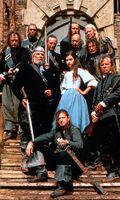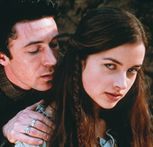

Romance, adventure, honor and intrigue play forefront roles in A&E's dramatic adaptation of the Blackmore classic "Lorna Doone," a made-for-television event that may well land itself a handful of Emmy nominations in this year's awards ceremony. Set in the "west country" of Great Britain during a turbulent seventeenth century, it centers around the story of two families forever divided. One is the once-noble Doones, a can of outlaws cast from their ancestral lands and under the brutal and often tyrannical reign of their leader, Sir Ensor. The other are the Ridds, a family of Yeomen farmers on the flatlands.
For generations, the Doones have terrorized the West Country with slaughter and theft, until at last, in the opening sequence of the film, this comes to a head. Jack Ridd, the well-meaning husband of Sarah and father to three children, is slain by a Doone in the marketplace. When Sarah, desiring retribution for her husband's death, goes to Sir Ensor, but is rudely scorned and sent away, young John vows revenge. Soon thereafter, in a fishing accident, he comes into the acquaintance of Lorna. Of course, he doesn't realize that she's a Doone until years later when he's sent in on a spying mission to the valley by his Uncle Reuben, who was badly whipped and robbed by the clan some days before.
Little does John know the vast importance of Lorna to her kin, that this "heir to this little realm of violence" is Sir Ensor's only bargaining tool against poverty. The young lovers must also deal with Lorna's elder cousin and next lord, Carver, who desires to claim her as his wife. How, too, will the Ridds react to family dealings with a Doone? True to form, we are given a magnificent and stirring glimpse into another time, another world in which a large selection of characters play host to a panning panorama of plot twists and unexpected surprises. Lorna Doone is a delight, visually as well as theologically; vengeance is replaced by forgiveness, anger with compassion, and the final climax is one you'll never forget.
The film differs from the book in many ways, while still keeping up the underlining story and characters, and, in my opinion, the changes are much improved. The novel, written from the point of view of John Ridd, portrayed the hero as a simpleminded and often stupid man, while this John Ridd is more passionate and clever than the other. We are also given a glimpse into life in the Doone valley, from both Lorna and Carver's point of view, which opens a door to a wide and tantalizing place for character development.
The
struggle for power between Sir Ensor (played by the ever-familior Peter Vaugan)
and Carver Doone (Aidan Gillen) is especially well portrayed; the clashing of
two generations of different ideals and passions. Lorna (Amelia Warner) has
obviously found a place in her grandfather's  heart, and this is the only
protection standing between herself and the violent obsession of her older
cousin. John Ridd (Richard Coyle) is surrounded by a host of deeply-involved and
well-played characters - the younger sister with a violent hatred for the
Doones (Joanne Froggatt), the clever and often silly middle sister, Annie
(Honeysuckle Weeks), and his well-meaning mother, played by Barbara Flynn.
heart, and this is the only
protection standing between herself and the violent obsession of her older
cousin. John Ridd (Richard Coyle) is surrounded by a host of deeply-involved and
well-played characters - the younger sister with a violent hatred for the
Doones (Joanne Froggatt), the clever and often silly middle sister, Annie
(Honeysuckle Weeks), and his well-meaning mother, played by Barbara Flynn.
The film left lasting impressions on the minds of the actors - Amelia Warner reflects on Lorna in this manner: "In the book, she is on a pedestal, this divine creature who does no wrong. When I read the book, I was a bit wary of having to play this rather serious, straight character. But the script brings out the 'feisty' in her. She's now a really modern character. Some of that feistiness comes from having to fight for things herself. She doesn't do all she's supposed to - she's not a rebel or difficult - but she has a strong sense of wrong and right. She won't sacrifice her morals, but she's also got a vulnerable side."
Other than the vast importance of choosing an excellent actor to portray the shy but passionate John Ridd, the biggest casting challenge filmakers faced was the part of Carver Doone. However, the moment Aidan Gillen stepped onto the set, they knew they had the right man for the job. His read-through "raised the hairs" on the back of the director's neck. Other than his obvious intimidation factor and striking good looks, Aidan's other pull was that his Carver was less one--sided and more dimensional. Costar Amelia Warner says, "Aidan's so sinister and yet so clever about it - I like the way he's played Carver because you can feel sorry for him. You do sympathize with him - he's not just a baddie."
But perhaps more than Lorna, it was Richard Coyle who received more of the tension. The two costars, although compatible in real life, unusually avoided one another during the shooting; which did a great deal to build up the obvious cracking intensity on screen. While Amelia often "sympathized" with Carver's deep and twisted personality, Aidan viewed his part differently: "What really attracted me [to the part] is the obsession he has for Lorna. He's fourteen years older than she is, and they have been destined to eventually marry. He's been waiting for her. But when she grows up, she is reluctant to have anything to do with him, pushing him away. Carver doesn't take that too well. The more she pushes him away, the more he wants her.... I believe he thinks he loves her, but he also really loves himself - he's quite self obsessed. He just wants to own her."
Filming, as with all television and film epics, was not smooth sailing all the way. The cast endured bad weather and unexpected casualties, one of which being Amelia's humiliating and yet hilarious fall into the mud. The day of shooting the scene in which Lorna and John meet for a second time at the river had just been proceeded by rainfall, and the mud was thick. Realizing that she wasn't going to be able to move when it came time for her to flee, Amelia tried in vain to inconspicuously tread herself to the surface... and the result? she fell flat on her face.
 Despite
these and other incidents, as well as the fact that she was forbidden by the
director to do her own riding, Amelia greatly enjoyed the experience, perhaps
because it contained a personal importance as well as a career leap. "It
was my mother's favorite book when I was a child. She gave me a copy once... I
don't think I read it, but I remember the woman on the front... this beautiful,
amazing woman in a scarlet gown."
Despite
these and other incidents, as well as the fact that she was forbidden by the
director to do her own riding, Amelia greatly enjoyed the experience, perhaps
because it contained a personal importance as well as a career leap. "It
was my mother's favorite book when I was a child. She gave me a copy once... I
don't think I read it, but I remember the woman on the front... this beautiful,
amazing woman in a scarlet gown."
Amelia got to wear the scarlet gown, and she got to portray one of the most intriguing and yet almost forgotten romantic heroines of all time. Truly the best television film I've ever seen, Lorna Doone is the very ideal of entertainment, with enough romance to encourage female interest, as well as battle scenes reminiscent of the great films to give it a masculine feel. The director and filmakers made masterful use of the foggy moors and dramatic changes in weather to further enhance the difference between the gloomy Doone Valley and the often sunlit Ridd farm. The cast are perfect in their roles, even to the point of expressing words with a mere glance of the eyes.
And what's more, it's worthy family viewing. With less than a handful of profanity, the only thing that tarnishes this spotless reputation is a minute amount of war violence, not overly graphic or gruesome but necessary to the plot. From the alabaster halls of London court to the breathtaking vastness of the moor, filled in by a haunting and formidable soundtrack, Lorna Doone is much more than standard fare - it's a classic.
Available on video & DVD - check your local library. Stars Amelia Warner, Richard Coyle, Aidan Gillen, Michael Kitchen, Peter Vaugan, and Barbara Flynn. Not rated - contains some mild language, strong thematic elements, and violence. Review written for Inkblots magazine.